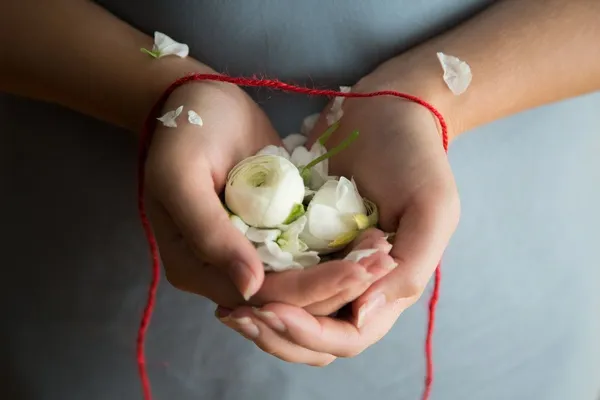Eye For Film >> Movies >> Knots: A Forced Marriage Story (2020) Film Review
Knots: A Forced Marriage Story
Reviewed by: Jennie Kermode

What do you think of when you hear about child marriage? There's a widespread assumption that it doesn't happen in the Western world, but in fact there are six states in the US where, with parental consent, marriage can take place below the age of 16. In Massachusetts the lower limit is 12. In Mississippi and California, there is no lower limit at all. The consequence of this is not simply naïve youngsters rushing into major commitments on the basis of first love; it is, all too often, girls being pressured into marriage by their parents. In one case which this documentary makes reference to, it was a girl being forced to marry the man who raped her.
The bulk of the film follows three women's stories. Fraidy, in New York, was raised in an Orthodox Jewish family and expected to have an arranged marriage, but found nobody willing to listen to her concerns or to help when she ended up with a husband who abused her. Nina, in Michigan, was raised in a patriarchal Christian family and coerced into marrying a man of her father's choosing. Sara, in California, tried to break away from her situation but was kidnapped by her father during a visit and forced to marry a man 13 years her senior.

If this doesn't sound bad enough, there's more. Child marriage in the US does not confer any of the other rights of adulthood. Children essentially become the wards of their older spouses. This means that if they try to leave - for instance, because they're facing violence - the police won't help them, and neither will most shelters. They'll be treated as runaways and returned to their marital homes. In effect, until they reach the age of majority, they are little more than slaves.
In light of the horror that this will induce in most viewers, director Kate Ryan Brewer deserves credit for choosing stories which, whilst powerful, don't lend themselves to easy sensationalism. The women are all good witnesses, able to describe their experiences in insightful ways without letting us forget how vulnerable they were when it all happened. Could they have refused? Could hey have run away? These questions are addressed with sensitivity and patience, reminding viewers how much harder it is to assert oneself as a child when all the adults in one's life seem to agree with each other. In Nina's case, she had been taught throughout her childhood that it wasn't her place to question male authority. In Fraidy's, walking away would mean being rejected by her whole community.
Where the film is less successful is in its use of dance to link segments of the film together. This is designed around a theme of knots and, whilst it's not badly delivered, feels out of place, its artiness awkwardly juxtaposed with the raw honesty of the women's accounts. It slows down the film, whilst the heavy-handed score tells viewers what to feel rather than leaving them room to explore the emotional nuance of the stories. Despite the horrific nature of those tales, there's a reason why these women are here to tell them. At a individual level, their resilience, and the cleverness that eventually enabled them to escape, are just as worthy of attention as their suffering.
In conjunction with this latter element, Brewer also gives us a look inside the organisations that do exist to try to help children who are facing what they have gone through. It looks at efforts to change the law and the disturbing opposition that some of those efforts have met with. There are deeper themes here about the perception of children as property and efforts to strip away hard-won rights from women. One of the film's strongest aspects is the way it illustrates that no matter where in the world one lives, it's all too easy to grow up unaware of one's rights and options due to the influence of family and community.
Knots will doubtless shock many viewers, but it's more than just an exposé. There are serious questions here about how this situation has lasted so long, and what can be done about it. Brewer strikes a good balance between addressing these and ensuring that we never lose sight of the human cost of it all.
Reviewed on: 03 May 2021


















